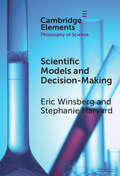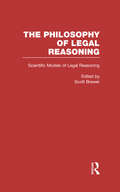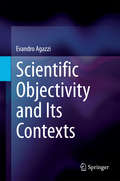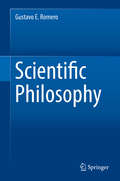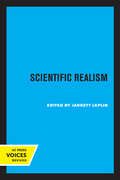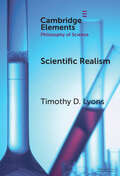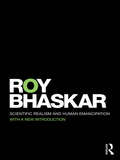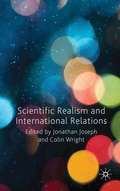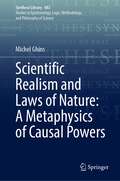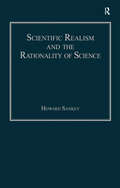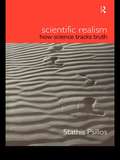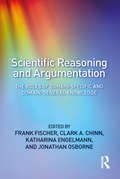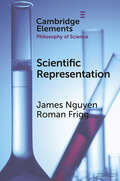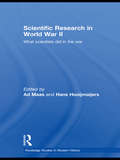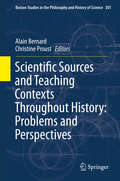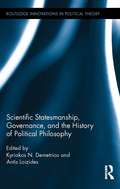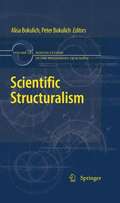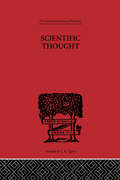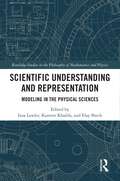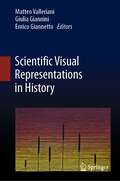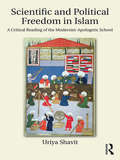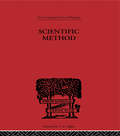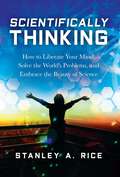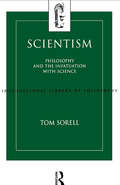- Table View
- List View
Scientific Models and Decision Making (Elements in the Philosophy of Science)
by Eric Winsberg Stephanie HarvardThis Element introduces the philosophical literature on models, with an emphasis on normative considerations relevant to models for decision-making. Chapter 1 gives an overview of core questions in the philosophy of modeling. Chapter 2 examines the concept of model adequacy for purpose, using three examples of models from the atmospheric sciences to describe how this sort of adequacy is determined in practice. Chapter 3 explores the significance of using models that are not adequate for purpose, including the purpose of informing public decisions. Chapter 4 provides a basic framework for values in modelling, using a case study to highlight the ethical challenges in building models for decision making. It concludes by establishing the need for strategies to manage value judgments in modelling, including the potential for public participation in the process.
Scientific Models of Legal Reasoning: Economics, Artificial Intelligence, and the Physical Sciences (Philosophy of Legal Reasoning: A Collection of Essays by Philosophers and Legal Scholars #No. 5)
by Scott BrewerFirst published in 1998. Routledge is an imprint of Taylor & Francis, an informa company.
Scientific Objectivity and Its Contexts
by Evandro AgazziThe first part of this book is of an epistemological nature and develops an original theory of scientific objectivity, understood in a weak sense (as intersubjective agreement among the specialists) and a strong sense (as having precise concrete referents). In both cases it relies upon the adoption of operational criteria designed within the particular perspective under which any single science considers reality. The "object" so attained has a proper ontological status, dependent on the specific character of the criteria of reference (regional ontologies). This justifies a form of scientific realism. Such perspectives are also the result of a complex cultural-historical situation. The awareness of such a "historical determinacy" of science justifies including in the philosophy of science the problems of ethics of science, relations of science with metaphysics and social dimensions of science that overstep the traditional restriction of the philosophy of science to an epistemology of science. It is to this "context" that the second part of the book is devoted.
Scientific Philosophy
by Gustavo E. RomeroThis textbook presents the basics of philosophy that are necessary for the student and researcher in science in order to better understand scientific work. The approach is not historical but formative: tools for semantical analysis, ontology of science, epistemology, and scientific ethics are presented in a formal and direct way. The book has two parts: one with the general theory and a second part with application to some problems such as the interpretation of quantum mechanics, the nature of mathematics, and the ontology of spacetime. The book addresses questions such as "What is meaning?", "What is truth?", "What are truth criteria in science?", "What is a theory?", "What is a model?" "What is a datum?", "What is information?", "What does it mean to understand something?", "What is space?", "What is time?", "How are these concepts articulated in science?" "What are values?" "What are the limits of science?", and many more. The philosophical views presented are "scientific" in the sense that they are informed by current science, they are relevant for scientific research, and the method adopted uses the hypothetical-deductive approach that is characteristic of science. The results and conclusions, as any scientific conclusion, are open to revision in the light of future advances. Hence, this philosophical approach opposes to dogmatic philosophy. Supported by end-of-chapter summaries and a list of special symbols used, the material will be of interest for students and researchers in both science and philosophy. The second part will appeal to physicists and mathematicians.
Scientific Realism
by Jarrett LeplinThis title is part of UC Press's Voices Revived program, which commemorates University of California Press’s mission to seek out and cultivate the brightest minds and give them voice, reach, and impact. Drawing on a backlist dating to 1893, Voices Revived makes high-quality, peer-reviewed scholarship accessible once again using print-on-demand technology. This title was originally published in 1984.
Scientific Realism (Elements in the Philosophy of Science)
by Timothy D. LyonsThe scientific realism debate directly addresses the relation between human thought and the reality in which it finds itself. A core question: can we justifiably believe that science accurately describes the reality that lies beneath the limits of human experience? Exploring this question, the Element begins at the most foundational level of scientific realism, the endeavor to justify belief in the existence of unobservables by way of abduction. Raising anti-realist challenges, some much discussed in the literature but also some generally overlooked, it works its way toward more refined variants of scientific realism. Because it takes scientific realism to be the default position of many – scientific realists themselves often assuming it is the default position of scientists – the emphasis will be on the challenges. Those challenges will also motivate the variants of scientific realism traced. The Element concludes with an articulation of the author's own position, Socratic scientific realism.
Scientific Realism and Human Emancipation (Classical Texts in Critical Realism (Routledge Critical Realism))
by Roy BhaskarFollowing on from Roy Bhaskar’s first two books, A Realist Theory of Science and The Possibility of Naturalism, Scientific Realism and Human Emancipation, establishes the conception of social science as explanatory—and thence emancipatory—critique. Scientific Realism and Human Emancipation starts from an assessment of the impasse of contemporary accounts of science as stemming from an incomplete critique of positivism. It then proceeds to a systematic exposition of scientific realism in the form of transcendental realism, highlighting a conception of science as explanatory of a structured, differentiated and changing world. Turning to the social domain, the book argues for a view of the social order as conditioned by, and emergent from, nature. Advocating a critical naturalism, the author shows how the transformational model of social activity together with the conception of social science as explanatory critique which it entails, resolves the divisions and dualisms besetting orthodox social and normative theory: between society and the individual, structure and agency, meaning and behavior, mind and body, reason and cause, fact and value, and theory and practice. The book then goes on to discuss the emancipatory implications of social science and sketches the nature of the depth investigation characteristically entailed. In the highly innovative third part of the book Roy Bhaskar completes his critique of positivism by developing a theory of philosophical discourse and ideology, on the basis of the transcendental realism and critical naturalism already developed, showing how positivism functions as a restrictive ideology of and for science and other social practices.
Scientific Realism and International Relations
by Jonathan Joseph Colin WightCritical and scientific realism have emerged as important perspectives on international relations in recent years. The attraction of these approaches lies in the claim that they can transcend the positivism vs postpositivism divide. This book demonstrates the vitality of this approach and the difference that 'realism' makes.
Scientific Realism and Laws of Nature: A Metaphysics of Causal Powers (Synthese Library #483)
by Michel GhinsThis book addresses central issues in the philosophy and metaphysics of science, namely the nature of scientific theories, their partial truth, and the necessity of scientific laws within a moderate realist and empiricist perspective. Accordingly, good arguments in favour of the existence of unobservable entities postulated by our best theories, such as electrons, must be inductively grounded on perceptual experience and not their explanatory power as most defenders of scientific realism claim. Similarly, belief in the reality of dispositions such as causal powers which ground the natural necessity of scientific laws must be based on experience. Hence, this book offers a synthetic presentation of an original metaphysics of science, namely a metaphysics of properties, both categorical and dispositional, while at the same time opposing strong versions of necessitarism according to which laws are true in all possible worlds.The main theses and arguments are clearly presentedin a non-technical way. Thus, on top of being of interest to the specialists of the topics discussed, it is also useful as a textbook in courses for third year and more advanced university students.
Scientific Realism and the Rationality of Science
by Howard SankeyScientific realism is the position that the aim of science is to advance on truth and increase knowledge about observable and unobservable aspects of the mind-independent world which we inhabit. This book articulates and defends that position. In presenting a clear formulation and addressing the major arguments for scientific realism Sankey appeals to philosophers beyond the community of, typically Anglo-American, analytic philosophers of science to appreciate and understand the doctrine. The book emphasizes the epistemological aspects of scientific realism and contains an original solution to the problem of induction that rests on an appeal to the principle of uniformity of nature.
Scientific Realism: How Science Tracks Truth (Philosophical Issues in Science)
by Stathis PsillosScientific realism is the optimistic view that modern science is on the right track: that the world really is the way our best scientific theories describe it . In his book, Stathis Psillos gives us a detailed and comprehensive study which restores the intuitive plausibility of scientific realism. We see that throughout the twentieth century, scientific realism has been challenged by philosophical positions from all angles: from reductive empiricism, to instrumentalism and to modern sceptical empiricism.Scientific Realism explains that the history of science does not undermine the arguments for scientific realism, but instead makes it reasonable to accept scientific realism as the best philosophical account of science, its empirical success, its progress and its practice.Anyone wishing to gain a deeper understanding of the state of modern science and why scientific realism is plausible, should read this book.
Scientific Reasoning and Argumentation: The Roles of Domain-Specific and Domain-General Knowledge
by Frank Fischer Jonathan Osborne Clark A. Chinn Katharina EngelmannCompetence in scientific reasoning is one of the most valued outcomes of secondary and higher education. However, there is a need for a deeper understanding of and further research into the roles of domain-general and domain-specific knowledge in such reasoning. This book explores the functions and limitations of domain-general conceptions of reasoning and argumentation, the substantial differences that exist between the disciplines, and the role of domain-specific knowledge and epistemologies. Featuring chapters and commentaries by widely cited experts in the learning sciences, educational psychology, science education, history education, and cognitive science, Scientific Reasoning and Argumentation presents new perspectives on a decades-long debate about the role of domain-specific knowledge and its contribution to the development of more general reasoning abilities.
Scientific Research In World War II: What scientists did in the war
by Ad Maas Hans HooijmaijersThis book seeks to explore how scientists across a number of countries managed to cope with the challenging circumstances created by World War II. No scientist remained unaffected by the outbreak of WWII. As the book shows, there were basically two opposite ways in which the war encroached on the life of a scientific researcher. In some cases, the outbreak of the war led to engagement in research in support of a war-waging country; in the other extreme, it resulted in their marginalisation. The book, starting with the most marginalised scientist and ending with those fully engaged in the war-effort, covers the whole spectrum of enormously varying scientific fates. Distinctive features of the volume include: a focus on the experiences of ‘ordinary’ scientists, rather than on figureheads like Oppenheimer or Otto Hahn contributions from a range of renowned academics including Mark Walker, an authority in the field of science in World War II a detailed study of the Netherlands during the German Occupation This richly illustrated volume will be of major interest to researchers of the history of science, World War II, and Modern History.
Scientific Sources and Teaching Contexts Throughout History: Problems and Perspectives
by Christine Proust Alain BernardThis book examines the textual, social, cultural, practical and institutional environments to which the expression "teaching and learning contexts" refers. It reflects on the extent to which studying such environments helps us to better understand ancient or modern sources, and how notions of "teaching" and "learning" are to be understood. Tackling two problems: the first, is that of certain sources of scientific knowledge being studied without taking into account the various "contexts" of transmission that gave this knowledge a long-lasting meaning. The second is that other sources are related to teaching and learning activities, but without being too precise and demonstrative about the existence and nature of this "teaching context". In other words, this book makes clear what is meant by "context" and highlights the complexity of the practice hidden by the words "teaching" and "learning". Divided into three parts, the book makes accessible teaching and learning situations, presents comparatist approaches, and emphasizes the notion of teaching as projects embedded in coherent treatises or productions.
Scientific Statesmanship, Governance and the History of Political Philosophy (Routledge Innovations in Political Theory #61)
by Kyriakos N. Demetriou Antis LoizidesOver the centuries, the question of "good" or "effective" governance has undergone several transformations and ramifications to fit within certain social, cultural and historical contexts. What defines political knowledge? What is the measure of expert political leadership? Various interpretations, perspectives, and re-conceptualizations emerge as one moves from Plato to the present. This edited book explores the relationship between political expertise, which is defined as "scientific statesmanship or governance," and political leadership throughout the history of ideas. An outstanding group of experts study and analyze the ideas of significant philosophers, such as Plato, Aristotle, Augustine, Machiavelli, Hobbes, Locke, Montesquieu, Kant, Burke, Comte, and Weber, among others. The contributors aim to interpret these thinkers’ approaches to "scientific statesmanship," deepening our understanding of the idea itself and decoding its theoretical complexities. In the face of the ongoing crisis of the traditional party system and the eroding structures within the new cultural-financial and political environment in the era of globalization, tracing the connection between Plato’s idealist statesmanship to twentieth-century modernist politics is an important and ever-challenging enterprise; one that promises to interest scholars of the history of western political thought, philosophy, classics and the classical tradition, political science, and sociology.
Scientific Structuralism
by Alisa Bokulich Peter BokulichRecently there has been a revival of interest in structuralist approaches to science. Taking their lead from scientific structuralists such as Henri Poincaré, Ernst Cassirer, and Bertrand Russell, some contemporary philosophers and scientists have argued that the most fruitful approach to solving many problems in the philosophy of science lies in focusing on the structural features of our scientific theories. Much of the work in scientific structuralism to date has been focused on the problem of scientific realism, where it has been argued that even in cases of radical theory change the most important structural features of predecessor theories are preserved. These structural realists argue that what our most successful theories get right about the world is these abstract structural features, rather than any particular ontological claims. More recently, philosophers of science have adopted structuralist approaches to many other issues in the philosophy of science, such as scientific explanation and intertheory relations. The nine articles collected in this volume, written by the leading researchers in scientific structuralism, represent some of the most important directions of research in this field. This book will be of particular interest to those philosophers, scientists, and mathematicians who are interested in the foundations of science.
Scientific Structuralism (Boston Studies in the Philosophy and History of Science #281)
by Alisa Bokulich Peter BokulichRecently there has been a revival of interest in structuralist approaches to science. Taking their lead from scientific structuralists such as Henri Poincaré, Ernst Cassirer, and Bertrand Russell, some contemporary philosophers and scientists have argued that the most fruitful approach to solving many problems in the philosophy of science lies in focusing on the structural features of our scientific theories. Much of the work in scientific structuralism to date has been focused on the problem of scientific realism, where it has been argued that even in cases of radical theory change the most important structural features of predecessor theories are preserved. These structural realists argue that what our most successful theories get right about the world is these abstract structural features, rather than any particular ontological claims. More recently, philosophers of science have adopted structuralist approaches to many other issues in the philosophy of science, such as scientific explanation and intertheory relations. The nine articles collected in this volume, written by the leading researchers in scientific structuralism, represent some of the most important directions of research in this field. This book will be of particular interest to those philosophers, scientists, and mathematicians who are interested in the foundations of science.
Scientific Thought: A Philosophical Analysis of some of its fundamental concepts (International Library of Philosophy)
by C.D. BroadThis is Volume I of a series of six on the Philosophy of Science. Originally published in 1923, this study offers a philosophical analysis of some of science's fundamental concepts and is ultimately based on a course of lectures delivered to the third year students of science at the University of Bristol in the session 1920-21.
Scientific Understanding and Representation: Modeling in the Physical Sciences (Routledge Studies in the Philosophy of Mathematics and Physics)
by Kareem Khalifa Insa Lawler Elay ShechThis volume assembles cutting-edge scholarship on scientific understanding, scientific representation, and their delicate interplay. Featuring several articles in an engaging ‘critical conversation’ format, the volume integrates discussions about understanding and representation with perennial issues in the philosophy of science, including the nature of scientific knowledge, idealizations, scientific realism, scientific inference, and scientific progress.In the philosophy of science, questions of scientific understanding and scientific representation have only recently been put in dialogue with each other. The chapters advance these discussions from a variety of fresh perspectives. They range from case studies in physics, chemistry, and neuroscience to the representational challenges of machine learning models; from special forms of representation such as maps and topological models to the relation between understanding and explanation; and from the role of idealized representations to the role of representation and understanding in scientific progress.Scientific Understanding and Representation will appeal to scholars and advanced students working in philosophy of science, philosophy of physics, philosophy of mathematics, and epistemology.
Scientific Visual Representations in History
by Matteo Valleriani Enrico Giannetto Giulia GianniniThis book explores continuity and ruptures in the historical use of visual representations in science and related disciplines such as art history and anthropology. The book also considers more recent developments that attest to the unprecedented importance of scientific visualizations, such as video recordings, animations, simulations, graphs, and enhanced realities. The volume collects historical reflections concerned with the use of visual material, visualization, and vision in science from a historical perspective, ranging across multiple cultures from antiquity until present day. The focus is on visual representations such as drawings, prints, tables, mathematical symbols, photos, data visualizations, mapping processes, and (on a meta-level) visualizations of data extracted from historical sources to visually support the historical research itself. Continuity and ruptures between the past and present use of visual material are presented against the backdrop of the epistemic functions of visual material in science. The function of visual material is defined according to three major epistemic categories: exploration, transformation, and transmission of knowledge.
Scientific and Political Freedom in Islam: A Critical Reading of the Modernist-Apologetic School
by Uriya ShavitThe modernist-apologetic approach to the relation between revelation and science and politics has been a central part of Arab discourses on the future of Muslim societies for over a century. This approach introduced historical and theological narratives and interpretative mechanisms that contextualize reason and freedom in Islamic terms to argue that, unlike with Christianity, it is possible for Muslim societies to be technologically and politically advanced without forfeiting revelation as an all-encompassing, legally-binding guide. ‘Scientific and Political Freedom in Islam’ critically examines the coherence and consistency of modernist-apologetic scholars. This is done through a discussion of their general theorizing on reason and freedom, which is then followed by discussions of their commentaries on specific scientific and political issues in light of their general theorizing. Regarding the former, the focus is Darwin’s theory of evolution, while the universality of the "Biblical flood," the heliocentric model, the Big Bang model and Freudianism are also discussed. Regarding the latter, the focus is Islam’s desired structure of government and concept of participatory politics, while individual freedoms are also discussed. The book argues that the modernist-apologetic approach has great potential to be a force for liberalization, but also possesses inherent limitations that render its theory on the relation between revelation and freedom self-contradictory. Introducing a significant body of new information on the reasons for the failure of secularism and democracy and the attitudes towards Darwinism in the Arab world, this book is a valuable resource for students and scholars of Islamic Studies, comparative religion, democracy studies and evolution studies.
Scientific method: An Inquiry into the Character and Validity of Natural Laws (International Library of Philosophy)
by A.D. RitchieFirst published in 2000. Routledge is an imprint of Taylor & Francis, an informa company.
Scientifically Thinking: How to Liberate Your Mind, Solve the World's Problems, and Embrace the Beauty of Science
by Stanley A. RiceShows the many advantages of thinking like a scientist and argues that today's problems require a scientific approach. You don't have to be a scientist to think like a scientist. Anyone can do it and everyone should. This book will show you how. The advantages are many: from detecting bias to avoiding error and appreciating the richness of the world. Author Stanley Rice, himself a scientist, explains that science is essentially organized common sense. While the brain is hardwired for common sense, unfortunately, it also relies on a number of misleading tendencies. Instead of reasoning objectively it tends to rationalize. Often it sees what it wants to see rather than what is really there. And it is adept at both self-deception and deceiving others. Rice notes that these tendencies were useful in the past as the human race evolved in an often-hostile environment. But today bias and delusions put us at risk of worldwide catastrophe. The author invites readers to participate in the adventure of scientific discovery. He provides many interesting and humorous examples of how science works. He shows how hypothesis testing can be used to tackle everyday problems like car trouble or seeing through the specious appeal of a fad diet. Beyond practical applications, science meets the basic human need to satisfy curiosity: it tells verifiable stories about the universe, providing humans with fascinating narratives supported by testable facts. The author also explores some of science's biggest ideas, including natural selection (creating order out of randomness) and interconnectedness (Earth's systems are intricately intertwined). Read this book and learn to think like a scientist. It will guard you against being manipulated by politicians, corporations, and religious leaders, and equip you to deal with the world's most pressing problems. And you will have a lot of fun doing it.
Scientism: Philosophy and the Infatuation with Science (International Library of Philosophy)
by Tom SorellFirst Published in 2004. Routledge is an imprint of Taylor & Francis, an informa company.
